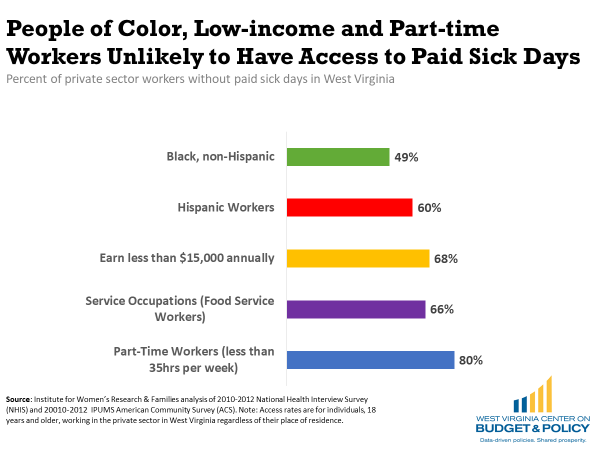This fall the convergence of flu season with the ongoing COVID-19 pandemic is likely to impact the health and safety of workers across the state. Both viruses on their own illustrate why it is an economic security and public health imperative that West Virginia workers are able to stay home from work — with paid and job-protected time off — when they are sick. Without access to earned paid sick leave, workers are forced to make difficult and even dangerous decisions. This is evidenced during the COVID-19 pandemic, as public officials and health professionals have urged people to stay home and “social distance” if they have symptoms of the virus, but workers without access to paid sick leave often cannot afford to miss work, risking potential exposure to their coworkers or the community.
Access to earned paid sick leave is closely tied to income. Nationally, 87 percent of the highest earners have paid sick leave benefits, while only 27 percent of the lowest income workers do. In West Virginia, 46.1 percent of private sector workers, approximately 254,000 West Virginians, lack access to paid sick leave when they are sick. Low-income earners, those working part-time, and Black and Hispanic workers are overrepresented in frontline and essential industries, and among the least likely to have access to paid sick days. Rural workers are less likely to have paid sick leave than their urban counterparts.

In West Virginia nearly seven out of ten workers making less than $15,000 annually lack the ability to earn paid sick days. This is particularly egregious, as many lower-wage jobs are ones that require frequent interaction with coworkers and the general public. These workers are overwhelmingly represented in the food service, leisure, and hospitality industries, where public health and community well-being considerations dictate that they should stay home if they have symptoms of communicable disease.
Without earned paid sick leave, workers must choose between going to work sick and losing much-needed pay. People without earned paid sick leave are 1.5 times more likely than those with the benefit to report going to work with a contagious illness like the flu or a virus. This is because these workers, often living paycheck to paycheck, face significant consequences if they miss work due to illness, potentially resulting in major hits to the household budget. Two days of unpaid sick time is the equivalent of a month’s worth of gas expenses, and three days of unpaid sick time is roughly the cost of a household’s monthly utility bills.
These difficult decisions extend into the public health realm as well. Parents who lack earned paid sick leave are two times more likely to send a sick child to school. The lack of leave also places a burden on our health system. Parents without earned paid sick leave are 2.5 times more likely to report taking their child to the emergency room because they couldn’t take time off during normal business hours.
Earned paid sick days are more important than ever as West Virginia and the world face an unprecedented public health crisis. Paid sick leave policies have been found to reduce flu infection rates by six to seven percent in the jurisdictions where they are enacted.
In addition to the public health benefits of allowing people showing symptoms of communicable disease to stay home from work, there are significant benefits for businesses and the economy. An analysis of an earned paid sick leave ordinance in Austin, Texas found that it would produce a net savings for businesses of $4.5 million per year by reducing turnover and presenteeism (working while sick) and increasing productivity. Workers are 25 percent less likely to leave a job if they have access to earned paid sick leave.
At least 42 jurisdictions have enacted paid sick leave policies, including 11 states and the District of Columbia. Federal legislation as part of the COVID-19 pandemic response enacted a temporary program offering up to two weeks of emergency paid sick leave for workers facing COVID-19 illness or quarantine. That program expires at the end of the year and excludes many workers. Still, it is an important recognition of the value of earned paid sick leave and the impact illness has on workers, businesses, and our communities. West Virginia can take action and enact statewide paid sick leave policy that ensures no workers are forced to choose between following doctor’s orders and paying their bills.